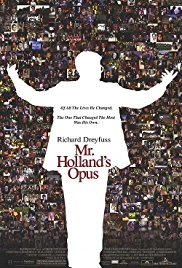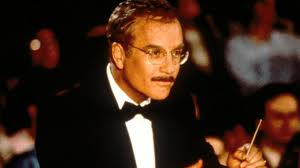EDUCATION
1. Many educators and parents believe that music should be part of the regular curriculum for all students in public schools and that individual music lessons should also be available from elementary school through high school to those students who want them. Do you agree or disagree?
2. What did the principal mean when she told Mr. Holland that a good teacher not only gives students facts but provides them with a compass?
3. Do you think that most students can be introduced to classical music through popular music?
4. Is there anything that could have been done to keep Mr. Holland’s job and the orchestra program? Suggested Response: See Small Wonders and Music of the Heart.
PARENTING – FATHER/SON, MOTHER/SON
5. (1) When Cole was a teenager Mr. Holland realized that he had been too distant from his son. Describe how Mr. Holland corrected for this in the film. (2) The film doesn’t show us everything that happened in Mr. Holland’s life and obviously, the concert and the song were only part of what he did in his effort to establish, however late, a good relationship with his son. What else could Mr. Holland have done to rectify his relationship with Cole?
Suggested Response:
Some examples: spend time with Cole doing activities that they both enjoyed, or at least that Cole enjoyed; take an interest in Cole’s activities.
6. How could Mr. Holland be a good teacher but not a terribly good parent?
Suggested Response:
People act very differently in different situations. A criminal who would mug an old lady or break into a house, when put into the military and allowed to bond with his unit, can become a courageous soldier.
7. Cole grew up relatively unscathed by his father’s problems in dealing with Cole’s deafness. Why do you think that happened?
Suggested Response:
There is no one correct answer to this question. TWM suggests the following: There are two important factors that contributed to Cole’s ability to escape emotional injury from his father’s inability to deal with Cole’s deafness. First, it was an innate, inborn strength and resilience in Cole himself. Second, Cole’s mother was able to make up for the father’s deficiencies. This often happens in families.
MALE ROLE MODEL
8. Would you consider Mr. Holland to be a male role model? Describe his strengths and weaknesses as a human being.
Suggested Response:
There is no one correct response to this question. However, a strong response will note that no matter what, Mr. Holland kept trying to be better than he had been in the past and that he fulfilled many of his responsibilities. On the negative side, he didn’t see, until the end, that he really was doing a great job as a music teacher; he should have been more nurturing to his son.
MARRIAGE
9. Cole’s deafness put a strain on his parents’ marriage? How could they have handled it differently?
Suggested Response:
They could have united in their efforts to help and nurture their son. Instead, Mr. Holland isolated himself and didn’t work on the situation as a partner in the relationship with his wife and a loving father to his son.
10. The film shows Mr. Holland’s wife doing nothing when she discovered that her husband had a crush on Rowena. Was this the best way for her to handle it? Explain your answer.
Suggested Response:
In this case, it was. Crushes happen throughout life and mature adults realize that there is more to relationships than physical desire and temporary infatuations.
12. Does the fact that Mr. Holland had a crush on Rowena for a while mean that he didn’t love his wife and that they had a bad marriage? Explain your reasoning.
Suggested Response:
Crushes happen and they don’t necessarily last. A short-lived crush doesn’t mean that the marriage is bad if the person experiencing the emotion has the maturity to realize what is going on and doesn’t act on it.
13. For Rowena, going away and following her muse was clearly the best thing to do. She suggested, in her effort to get Mr. Holland to leave with her, that he could write his music in New York City. Why wasn’t going away and writing music the best thing for Mr. Holland?
Suggested Response:
Mr. Holland was a teacher and that was his calling in life. In addition, he had a family. He could not keep up his loving relationship with his family by running off with Rowena.
DISABILITIES
14. Compare how Mrs. Holland responded to her son’s deafness with the manner in which his father responded.
15. Mr. Holland obviously felt separated from his son because of the child’s deafness. What did he and his son miss as a result?
16. Why did the filmmakers include the scene in which Mr. Holland was describing Beethoven’s deafness to one of his classes? What were they trying to tell us?
17. Remember the situation in which Mr. Holland and his wife had received advice from a doctor that they should not try to use gestures to communicate with Cole? Did that strategy work? Have you ever been in a situation in which a doctor or another professional gave you advice that did not work? What did you do?





